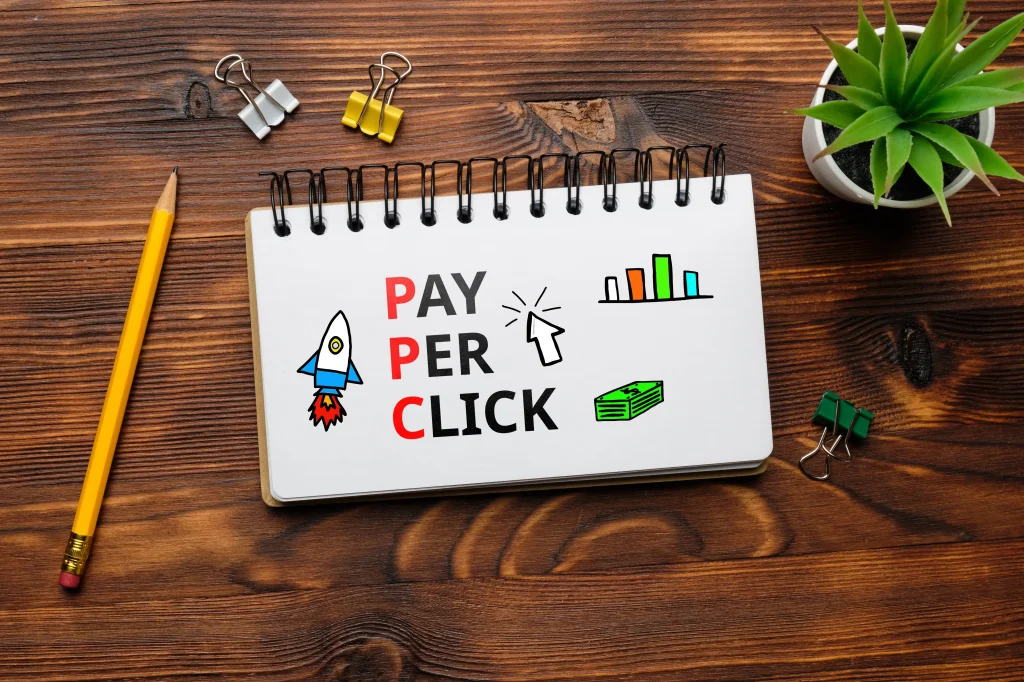
Top 5 tips to get best ROI in pay-per-click advertising?
You’ve found the right place if you’ve heard about Pay-per-click advertising or PPC marketing and are interested in finding out more, or if you know and want to use PPC marketing to market your business but aren’t sure how to get started. If you want to learn everything there is to know about pay-per-click advertising, you’ve come to the right place:
What is Pay-per-click advertising?
Pay-per-click advertising, abbreviated as PPC marketing, is a model of online marketing in which the advertiser gives up payment each time one of their ads is clicked on by a potential customer. You are not doing anything other than purchasing clicks from people who are probably interested in what it is that you have to offer (or a landing page or app).
When pay-per-click advertising is operating effectively, the return on investment is typically rather high, which results in a low cost per click. Take the following example into consideration: you pay $1.56 for a click, and that click results in a $100 sale for your business.
There is a wide variety of formats available for pay-per-click advertisements, including text, photos, videos, and hybrids of these formats. They may appear in a number of different locations, such as search results, websites, social media, and other online platforms.
Search engine marketing, often known as sponsored search or search engine advertising, is one of the most prominent forms of pay-per-click advertising. It refers to the practice of advertising on search engines. Advertisers are able to compete against one another in this model for clicks on sponsored links that are displayed on search result pages.
If, for example, a bid is placed on the keyword “google ads audit,” our advertisement for the Google Ads Performance Grader, which is a free tool, has a chance of appearing on the search engine results page (SERP) for that query or one that is similar to it.
How does Pay-Per-Click advertising work?
The following are the procedures that are commonly involved in pay-per-click advertising (PPC), but the specifics can vary depending on the medium.
Choose the format of your campaign that is most suitable for reaching your final goal. Adjust both your targeting and your settings to achieve the best possible outcomes (audiences, devices, locations, schedule, etc.).Specify both your financial plan and your strategy for the auction. Simply enter the address of the website that you wish to view (the landing page). If you want to know how website speed can impact your business expansion read this article-Ways to boost your website performance.
Publish an advertisement: When an advertisement goes live, its placement, cost-per-click, and other metrics are all determined by an algorithm. This algorithm takes into account the advertiser’s budget, bid, and campaign settings, as well as the ad’s quality and relevance.
Advertisers who invest the time and effort required to develop high-quality, user-friendly pay-per-click advertising (PPC) campaigns are rewarded by the platforms that host those campaigns with higher ad placement and lower prices.
In order to maximize the amount of money you make from pay-per-click advertising, you need to become an expert in the relevant PPC tactics.
What are Google ads?
Google Ads is unrivaled when compared to other pay-per-click advertising (PPC) platforms on the market. Businesses have the ability to create advertisements that will appear on Google Search and other Google sites by using the Google Ads platform.
When a user does a search, Google looks at all of the available ads and chooses the ones that are most relevant to show on the page with the search results.
The “winners” are chosen based on a number of criteria, some of which include the size of the keyword bid, the relevance of the ad, and the quality of both the keywords and the advertising campaigns. In the following paragraph, we will discuss this topic in greater detail.

How to conduct productive keyword research for PPC campaigns?
Researching Keywords for Pay-Per-Click Ads, a Step-by-Step Guide:
Researching keywords for pay-per-click advertising(PPC) campaigns is unquestionably important, but it may take up a lot of time. Your entire pay-per-click marketing campaign will succeed or fail based on the keywords you choose, which is why the most successful Google Ads marketers are constantly working to broaden and improve their keyword pool.
When you start a campaign with only one round of keyword research, you run the risk of missing out on hundreds of thousands of valuable long-tail keywords that are also relatively inexpensive and highly relevant.
You can read our detailed guide on keyword research to learn more, but in short, a good list of PPC advertising keywords will have the following:
Attention should be paid to conversions; you shouldn’t squander money on clicks that won’t result in sales. This indicates that the bids you place on keywords have to have a clear relationship to the items or services that you provide. When conducting keyword research, make sure that you cover all of your bases.
Don’t just concentrate on the terms with the highest volume and popularity in your industry; also think about the long-tail variations of those terms. These are specific search terms that bring in a significant amount of traffic to search engines. Because they have fewer competitors than their competitors, they also have a lower price.
Massive; Pay-per-click advertising (PPC) is an iterative process. The optimization and development of your campaigns, as well as the creation of an environment in which your keyword list is constantly expanding, are both crucial aims to work towards.
What is Pay-Per-Click advertising campaign management?
Utilizing pay-per-click advertising after the launch of new initiatives is critical to continue maintaining active campaign management. In fact, regular use of an account is an excellent predictor of future achievement. If you want to get the most out of your campaigns, you should routinely examine the information in your account and make the modifications that are listed below:
Make sure you use the right PPC advertising keywords in your advertising to get a better return on your money and more exposure. Try using negative keywords, which are words or phrases that aren’t likely to result in a conversion, to boost the relevance of your campaign and cut down on the amount of money you throw away.
Compare the following costly PPC keywords: You might want to think about disabling any expensive keywords that aren’t providing results.
Optimization of the landing page of a website: Conversion rates can be increased by adapting the content of landing page calls to action and other elements to specific search queries. Try to prevent your visitors from being funneled onto a single page.
Testing with A and B: Your click-through rate (CTR) and quality score will both improve if you divide your ad groups into smaller, more relevant subgroups. This will also help you create ad text and landing pages that are more specifically geared toward your target audience. This section delves deeper into account structure and discusses it in greater detail.
How can you start with Pay-Per-Click advertising?
Either want to start PPC advertising or if you are already using Google Ads, follow these steps
- Create a new account with Google Ads by signing in.
- Choose campaigns from the list of options located on the left side of the screen.
- Clicking the plus sign will bring up a menu where you can add a new campaign.
- Find out what you want to accomplish with the advertising for your campaign.
- After making your selections for the outcomes you seek from the conversion process, click the Continue button.
- Choose a method of advertisement, and then click the Next button.
Conclusion
Pay-per-click advertising involves a payment made by the advertiser every time one of their digital ads is clicked. You are, in essence, purchasing clicks from interested parties to your website. If you want to start with Pay-per-click advertising and want expert advice to reach the experts of digital media marketing at Ommune.